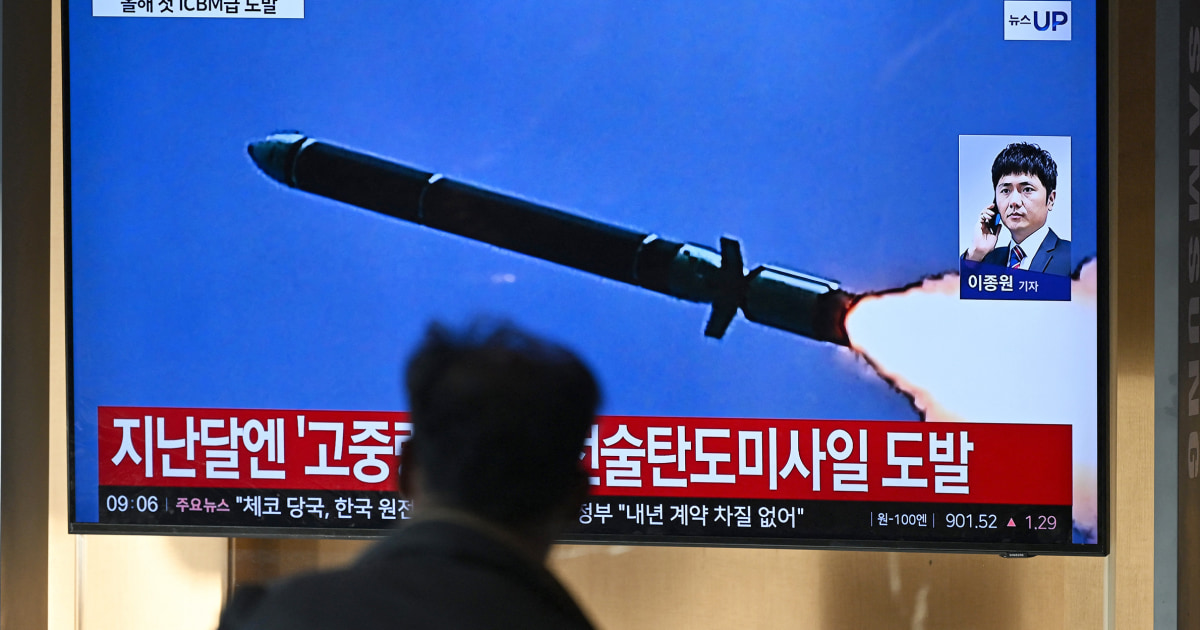World
North Korea launches suspected long-range missile days before U.S. election

SEOUL, South Korea — North Korea test-fired a suspected long-range ballistic missile that is designed to strike the continental United States, its neighbors said Thursday, days before the U.S. presidential election.
The White House characterized the weapon as an intercontinental ballistic missile, or ICBM, which have ranges of at least 3,500 miles and are designed mainly to deliver nuclear weapons. This would be the first ICBM launch since December for North Korea, a reclusive nuclear-armed state that has been ratcheting up its rhetoric against the U.S. and its allies South Korea and Japan.
The missile was launched at a sharply raised angle from a site near the North Korean capital, Pyongyang, at 7:10 a.m. local time (6:10 p.m. Wednesday ET), South Korea’s Joint Chiefs of Staff said, adding that it was suspected to be an intercontinental ballistic missile.
Japanese Defense Minister Gen Nakatani later said the missile fell into the sea off North Korea’s east coast around 8:37 a.m. He said the launch time of 86 minutes would be the longest ever for a North Korean missile test, and that it could be a new type of missile.
Japanese officials said the missile landed outside the country’s exclusive economic zone and that there were no reports of damage. But both Japan and South Korea condemned the launch as a threat to their safety as well as that of the international community.
In a statement, National Security Council spokesperson Sean Savett condemned the launch as a “flagrant violation” of multiple United Nations Security Council resolutions, saying it “needlessly raises tensions and risks destabilizing the security situation in the region.”
According to the U.S. Indo-Pacific Command, the launch did not pose an immediate threat to U.S. personnel or territory or to its allies South Korea and Japan, which host tens of thousands of U.S. service members.
The launch came a day after South Korea’s Defense Intelligence Agency told lawmakers that North Korea could launch an ICBM around the U.S. election or even hold its seventh nuclear test, which has been anticipated for some time. North Korea’s last nuclear test was in September 2017.
The ICBM that North Korea launched last December, the solid-fueled Hwasong-18, had a lofted trajectory flight time that suggests a potential range of 9,300 miles on a normal trajectory, putting it within striking distance of anywhere in the mainland U.S. Officials say the flight time for the most recent launch was longer.
However, experts say North Korea has yet to master the technology needed to build warheads small enough to be placed on those missiles and protect the warheads during atmospheric reentry.
The latest launch comes as Pyongyang, which is strengthening security ties with Moscow, is believed to have sent thousands of soldiers for training in Russia’s Far East, some of whom may have already moved toward Ukraine. The U.S. and others say that in exchange Russia may be providing North Korea with key technology necessary to advance its nuclear and ballistic missile programs.
North Korea has said the deployment is a “rumor,” while Russian President Vladimir Putin did not deny the reports when asked about them by NBC News last week.
Defense Secretary Lloyd Austin and his South Korean counterpart, Kim Yong-hyun, condemned the deployment at their annual bilateral meeting in Washington on Wednesday.
Austin said it would be “very disturbing” if North Korean soldiers entered the Russian fight against Ukrainian forces, and that they could be killed as a result.
“Their actions have consequences, as all actions have consequences, and they need to be mindful of that in terms of what could happen,” he said.
Stella Kim reported from Seoul, Arata Yamamoto from Oshu City, Japan, and Jennifer Jett from Hong Kong.










